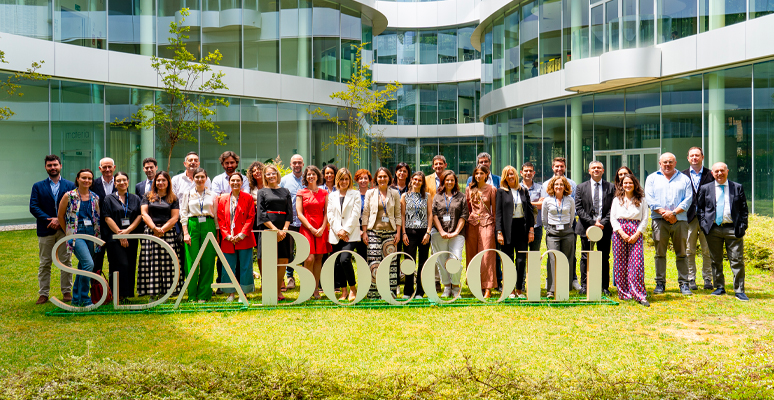SDA Bocconi conducted an analysis of the Innovation Projects developed by participants in the Executive Master in Management of Public Administrations (EMMAP) between 2019 and 2025, including those presented during the July 9-11 workshop, where the 26 students from the XV cohort presented their project results achieved over the last 12 months during their Master program. This analysis provides a true "snapshot" of change within Italian Public Administration, captured through the 176 interventions carried out by Master graduates over the last six years.
Innovation Projects represent one of EMMAP's most effective teaching tools. Each participant designs and implements a concrete improvement intervention within their professional context, translating the knowledge and skills developed during the 13-month Master into practice. This highly formative experience serves three main purposes: creating conditions to apply classroom learning to the workplace; initiating concrete and tangible change in organizations; consolidating change management skills.
In relation to the different projects, recurring managerial challenges emerged that participants addressed over time, bringing change to the beneficiary organizations:
- Value generation and results orientation: 62 out of 176 analyzed projects (35%) worked to orient management toward creating value for internal and external stakeholders, whether social, environmental or economic. Attention focused on building new management practices or consolidating existing ones while ensuring stronger end-user orientation. These projects often introduced monitoring practices, impact evaluation and data-driven strategic management to better support decision-making processes. The entities most involved in these projects are primarily municipalities, provinces and metropolitan cities (27% of this cluster's total), followed by instrumental bodies and public or mixed companies (26%) and institutes, central agencies and their territorial branches (21%). Designing management systems with greater value orientation represents a challenge addressed more by female participants, equally distributed between roles as officials with responsibilities and senior directors or managers.
- Service re-design and strategic repositioning: other projects (46, representing 26% of the analyzed sample) arose during periods of significant change, such as mergers, reorganizations, budget reductions and profound shifts in service demand. The focus was generally on complexities connected to new institutional configurations or external "pressures" (e.g. financial constraints, PNRR, new services to activate) in local entities (26% of projects belonging to this group), central institutes and agencies (20%), instrumental bodies and publicly held companies (17%), universities and research institutions (17%). The proponents of these projects are predominantly senior entity figures, males, who often addressed strategic challenges by adopting service reconfiguration as their approach, aiming to make services closer to citizen/user needs while making them more sustainable for the organization itself.
- Competency-based management: 28 projects (22%) focused on attracting and retaining personnel, with a strategic approach to human resource management: they introduced or strengthened competency management systems, personnel development plans, pathways for young talents, continuous learning initiatives and comprehensive human capital development, including within organizational model redesign processes. Among beneficiary entities, local entities stand out first and foremost (45% of projects in this group), followed equally by central institutes and agencies (11%), ministries and the presidency of the council (11%), universities and research institutions (11%). Women (53% of projects) and men (47%) chose to invest in these challenges, in various leadership and non-leadership roles, in both line and staff functions.
- Process improvement and integration: 30 participants (17%) addressed the challenge of improving integration between functions and departments, overcoming "organizational silos". The projects worked on both reengineering key processes and strengthening intersectoral coordination, through strategic application of micro- and macro-organizational design tools. In this case too, local entities primarily benefit (37%) but also institutes like INPS and central agencies (30%), thanks to projects implemented especially by officials with responsibilities and great mastery of operations, more women (57%) than men (43%).
The involvement of users, citizens and internal and external stakeholders was the common thread running through the development of all analyzed projects: in two cases out of three, project ideas were supported by adopting participatory tools and processes that made administrative action more inclusive and accelerated decision-making.
The comprehensive analysis of these experiences also revealed evolving managerial needs within Public Administration. In the pre-COVID period, attention focused mainly on internal process consolidation and "ordinary" management of public activities. During the health emergency and the first phase of the PNRR, there was strong acceleration in digitalization projects, service re-design and crisis management. After 2022, emphasis shifted to process integration, simplification, accessibility and impact measurement.
All this demonstrates how EMMAP is not only a high-level training program, but a true catalyst for change in the public sector, capable of generating value for both people and organizations, through the commitment and skills of its participants.
To explore the projects, visit the page EMMAP: Innovation Projects | SDA Bocconi School of Management
SDA Bocconi School of Management






